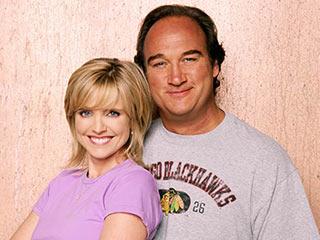POSTS
Time for a startup: The Writers Strike
BlogThe WGA strike began during my unplanned writing hiatus, but as it’s still with us, I suppose this post is still relevant. Now this topic, when brought up with my writer girlfriend and The League quickly heated up passions in a hurry, so let me be clear first and foremost.
I think that the writers are absolutely right to be on strike for the reasons they’ve identified. They see the writing on the wall and know that digital distribution is going to be an important revenue stream that their ideas gave breath to. They are absolutely entitled to residuals / royalties / etc. The idea that Tim Kring, the visionary behind “Heroes” was not getting my economic yes-vote as I watched the DVDs upsets me ( maybe he needs one of those e-tip jars? ).

But let’s be straight here, the majority of network TV is absolute crap (above). It’s chocked-full of reality TV shows: American Idol, Top Model, etc., lame sit-coms with the impossibly hot wife with the fat, surly, paterfamilias of laffs ( “According to Jim”, “That show with Jamie Gertz and the Fat Guy”), and, uh, I’m sure some other stuff that I don’t know about.
Moving to watching “The Best” TV shows on DVD is effectively like getting network TV a la carte ( which, incidentally, we ought to be able to do on cable at a reasonable rate: ESPN Classic? No thanks. More HBO’s? Yes!) and the talent behind the most frequently chosen dishes should find themselves rewarded for crafting more appealing entertainment. My plea for peace done, let me move to my thesis.
If you hate having to come to the table against the fat cats that run the factory you live in, maybe you should stop working at the factory?

I see being a writer as being very similar to being a programmer working for a large company.

If you work for Initech, you can be assured a decent paycheck, decent benefits, and decent retirement. While the programming will not be edgy or truly creative (“Hm, let’s plug some legacy Perl code today!”) the hours are predictable and so is the cheque. At many points in life, this is a sensible model for remuneration.
If you work for a studio, you can be assured a decent paycheck, decent benefits, and decent retirement. While the writing will not be edgy or truly creative ( “OK, so the wise-ass fat kid walks in and zings his dad, cue track” ) the hours are predictable and so is the cheque. At many points in life, this is a sensible model for remuneration.
Some perspective from “Office Space”.
Peter Gibbons: What if we’re still doin’ this when we’re 50?
Samir: It would be nice to have that kind of job security.
Peter Gibbons: Lumbergh’s gonna have me work on Saturday. I can tell already. I’m gonna end up doin’ it, because, uh… [nods]
Peter Gibbons: because I’m a big pussy… which is why I work at Initech to begin with.
Michael Bolton: Uh, yeah, well, I work at Initech and I don’t consider myself a pussy, OK?
Samir: Yes, I am also not a pussy.
But if the status quo is similar for both writers and programmers, let me ask, is not the solution to the slow lobotomy of working for Initech for programmers available to writers as well? That is, a start-up?
The classic story that I saw so many times in my years in the Valley was basically this. A smart group of people make a widget, they work hard, beat the market, Initech comes and buys the company or the IP, the engineering staff tolerate it long enough to get the options to vest, they bail, and build another widget, rinse repeat.
Now this is a scary model. Who’s paying you while you’re in stealth mode? Who’s paying the insurance on you, your wife, and kids? The bank won’t care that you’re bravely piloting into an unknowable fog trying to improve the living standards of humans when your mortgage payment comes due, Uncle Sam doesn’t cut your taxable burden the year you sell that ton of options to fund your dream, etc.
Nevertheless engineers by the dozen take that entrepreneurial stab into the dark and we get great things: Google, Cisco, Apple, Microsoft, Intel, etc. All of these behemoths started with just a few guys taking a grab in the darkness to try to find the brass ring. I’m sure there were a few years where the old Toyota had to stay the family car longer, or the few years the kids shared a room, or the tut-tut of a busybody when the engineer spent another evening in the garage, but when lightning struck, the economic stratum changed dramatically as did the ancillary lifestyle.
My question, why don’t some of these writers go for a startup model? At previous points in history, producing independent content was incredibly expensive, distribution was expensive and limited to a few channels, ditto promotion, and revenue collection was byzantine and ad-based. That has all changed ( well, except for the ad-based revenue, and that you can now get to sans middleman ).
A small HD camera is less than 5K (Canon XH A1). That and a MacPro and you have a sizable editing studio at your fingertips for 10K. Toss in internet video distribution (Google) and promotion (MySpace / Facebook / Whatever ) , and PayPal to secure revenues in return. Oh and what about the actors? Well, for the price of a Southwest ticket to LA, a print run of 300 leaflets, and the time it takes to walk to all the Starbucks’ in Hollywood and hand said leaflets to the barista’s, you could have a full audition room. And in other news, help may be on the way: what if a certain company who just got shot the middle finger by NBC, but who has control of the largest computer-based distribution software on the market were to decide to parlay itself into being an independent production studio? I think you should be able to make a few shows for under 30K - or less.
Imagine being a writer who comes with a startup elevator pitch versus that having to wait as a rep goes to the bargaining table engaging in the Entertainment Industry 0.9 collective bargaining pow-wow?
Hi Mr. Fat cat. I have a lower-production concept show that pulls 10,000 downloads a month and has proven to be a hit in that target “cynical-adult-swim-addicted-male-between-18-and-35-market”. I’d like more production, a bigger and more reliable cheque, known actors, and creative control. Whaddaya say? No, well, OK, maybe your competitor will take that risk.
It would only take one show to erupt out of this WGA strike under this model to completely force the oil-barons, er, studio heads to realize that the internet was about to seriously fuck their shit up in a Napster-size way like their clueless buddies in the music industry before the next WGA negotiation would take a wholly new character.
But that takes a lot of brass, as David Mamet would say. And, when you’re facing the mortgage on your bungalow in Glendale you’re not really thinking about how to embrace not just the new revenue streams of new media but it’s game-changing power as well, no you’re thinking about the wear-and-tear on the KIA as you plug your way over to Burbank. So it’s not surprising that, just like cube-farm code-monkey brethren, the writers are living the lives of quiet desperation: wanting more control over the cruise ship, but being afraid to figure out how to swim on their own in seas of uncertainty.
Lauren asserted that she liked some of the high-gloss shows and that what I proposed would run them out, if I were correct. Do I think all shows go to this spin-in / startup model? I doubt it. You would still have your high-production stories filmed on expensive sound-stages like “Desperate Housewives” or “Gray’s Anatomy”, but mixed into the network’s portfolio would be these spin-ins as well. There’s nothing stopping an Internet-based concept show from re-filming and re-delivering to the traditional audience once the proof-of-concept ( as we say in the tech trade ) had been established on an internet site. Furthermore, with these spin-ins in the portfolio, when the next bargaining discussion comes, and it will, there will be one to many data points which say, on behalf of the writers to the studio heads: “We don’t need you anymore, but you really, really need us.”
Another complaint might well be “But what about longevity of a show? When the writer runs out of ideas, the show goes away”. And this is a bad thing how? It’s only a bad thing for ad companies and the networks’ ad-sale model. When the story gets old and the writer moves on we as an audience can love what we had and remember it at its best. Ricky Gervais proved that with his “The Office”, HBO’s “Rome” only ran two seasons, and honestly, how many light years better is the 2nd season of Friends than the 1000th? Remember a time when Ross wasn’t a total eunuch waiting for his next pratfall? Longevity serves only to line pockets, it does nothing to advance art. And that’s an OK thing. Many startup people get tired at some point and take a board job and start taking the regular cheque: but the sleep knowing that they piloted their bark on the path of their own choosing until the moment they decided to step onto the luxury liner.
If big industries can outsource legal paperwork and CPA work to India for pennies on the dollar, who can say it wouldn’t be possible to outsource writing the average “According to Jim” script. Oh, you think that only Americans can produce American humor for Americans? You think telling a fart joke is harder than putting together someone’s 1040? I’m sorry to say my writer friends, you’re living under a rock if you think that contingency isn’t being thought about. Do you find solace in the Union’s influnce: that if you go so do all the directors? Well the 3-camera sit-com has been around long enough to be a standard, do you think a studio couldn’t get a script written in India, a Korean director, and a busload of non-SAG farmkids off the bus to act circumvent this whole mess? I’m not so sure.
You’re going to be forced to prove yourself sooner or later and be measured by the strength of your talents why not get a jump on the skillset?